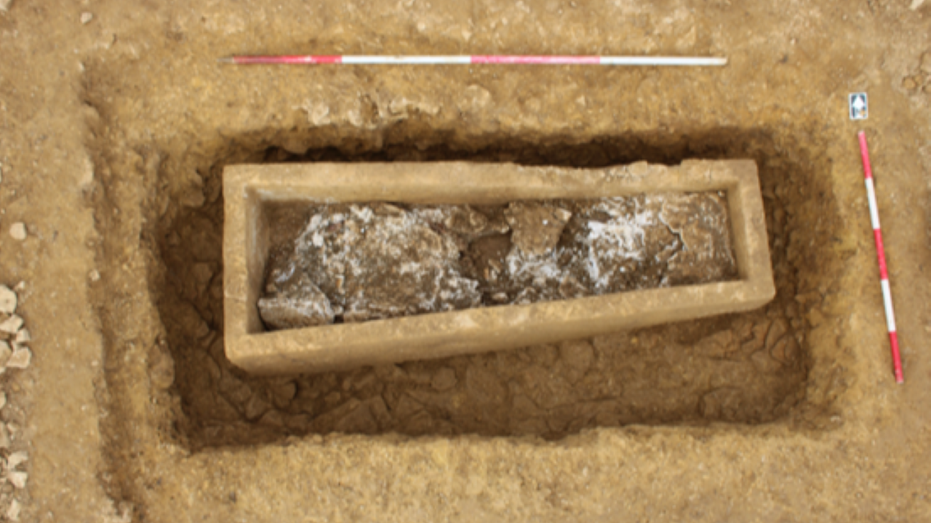
Highway workers found an ancient Roman cemetery, including a grave filled with a curious substance, during a recent highway construction project in England.
The announcement was made last week by National Highways, a government-owned transportation authority in England. The unusual coffin was discovered along the A47 road, which connects the West Midlands city of Birmingham to Suffolk.
According to officials, the coffin, made of stone and carved by hand, had been “undisturbed since its burial in Roman times over 1,500 years ago.” Twenty-three other graves, possibly indicating a familial or community burial site, were found nearby.
The discovery was part of a “small Roman roadside cemetery,” which was unearthed as highway workers worked to upgrade the highway.
“Part of the A47 between Wansford and Sutton near Peterborough follows the line of an old Roman road,” National Highways said.
Authorities called the coffin, which weighs roughly 1,600 pounds and measures 6½ feet, “a rare find.”
ARCHAEOLOGISTS STUMPED BY STRANGE ALIEN-LIKE FIGURINE DATING BACK 7,000 YEARS: ‘RAISES QUESTIONS’
“Stone coffins are uncommon,” the statement explained. “Only around 50 have been discovered around Roman Britain.”
The coffin was so heavy in part because it was filled with a substance called white gypsum, which is a mineral used in plaster-making, archaeologists found. Experts place the coffin between 43 A.D. and 410 A.D. but have not determined the exact year it was made, nor the reason gypsum was inside the coffin.
CLICK HERE TO SIGN UP FOR OUR LIFESTYLE NEWSLETTER
“It could be the coffin of a high-status individual in the local community,” National Highways noted.
“We don’t know exactly why bodies were encased in plaster. It could also indicate the burial of a wealthy person.”
The press release noted that archaeologists “delicately” started the process of removing bones from the plaster and that some fragments “bore the imprints of the cloth the body had been buried in.”
For more Lifestyle articles, visit foxnews.com/lifestyle.
Interestingly, the plaster also took the shape of the body itself. Experts found other oddities in the surrounding graves, including what may have been a young woman’s dowry.
“One grave of a young woman contained a collection of valuables, all laid at the feet of the body,” the organization said. “This could be the dowry of a young woman accompanying her into the afterlife.
“The grave also contained glass and ceramic drinking vessels, possibly for a last toast at the graveside or a commemorative anniversary.”
Ancient Roman discoveries are not uncommon in the United Kingdom.
Last fall, a 2,000-year-old road, built shortly after the Roman invasion of Britain in 43 A.D., was uncovered in London.
Fox News Digital’s Ashlyn Messier contributed to this report.
Highway workers found an ancient Roman cemetery, including a grave filled with a curious substance, during a recent highway construction project in England.
The announcement was made last week by National Highways, a government-owned transportation authority in England. The unusual coffin was discovered along the A47 road, which connects the West Midlands city of Birmingham to Suffolk.
According to officials, the coffin, made of stone and carved by hand, had been “undisturbed since its burial in Roman times over 1,500 years ago.” Twenty-three other graves, possibly indicating a familial or community burial site, were found nearby.
The discovery was part of a “small Roman roadside cemetery,” which was unearthed as highway workers worked to upgrade the highway.
“Part of the A47 between Wansford and Sutton near Peterborough follows the line of an old Roman road,” National Highways said.
Authorities called the coffin, which weighs roughly 1,600 pounds and measures 6½ feet, “a rare find.”
ARCHAEOLOGISTS STUMPED BY STRANGE ALIEN-LIKE FIGURINE DATING BACK 7,000 YEARS: ‘RAISES QUESTIONS’
“Stone coffins are uncommon,” the statement explained. “Only around 50 have been discovered around Roman Britain.”
The coffin was so heavy in part because it was filled with a substance called white gypsum, which is a mineral used in plaster-making, archaeologists found. Experts place the coffin between 43 A.D. and 410 A.D. but have not determined the exact year it was made, nor the reason gypsum was inside the coffin.
CLICK HERE TO SIGN UP FOR OUR LIFESTYLE NEWSLETTER
“It could be the coffin of a high-status individual in the local community,” National Highways noted.
“We don’t know exactly why bodies were encased in plaster. It could also indicate the burial of a wealthy person.”
The press release noted that archaeologists “delicately” started the process of removing bones from the plaster and that some fragments “bore the imprints of the cloth the body had been buried in.”
For more Lifestyle articles, visit foxnews.com/lifestyle.
Interestingly, the plaster also took the shape of the body itself. Experts found other oddities in the surrounding graves, including what may have been a young woman’s dowry.
“One grave of a young woman contained a collection of valuables, all laid at the feet of the body,” the organization said. “This could be the dowry of a young woman accompanying her into the afterlife.
“The grave also contained glass and ceramic drinking vessels, possibly for a last toast at the graveside or a commemorative anniversary.”
Ancient Roman discoveries are not uncommon in the United Kingdom.
Last fall, a 2,000-year-old road, built shortly after the Roman invasion of Britain in 43 A.D., was uncovered in London.
Fox News Digital’s Ashlyn Messier contributed to this report.



